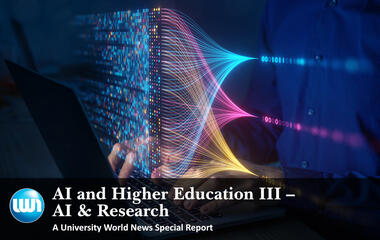Edtech, AI and Higher Education: Latest Stories
UNITED KINGDOM
|
Karen MacGregor
With 92% of students now using generative AI in some form, AI tools are clearly here to stay, says Josh Freeman, author of a just-published survey of AI use by students across the United Kingdom. “The next phase has to be the integration of AI into course content and into the way we teach,” he said.
|

|
|
|
|
CHINA
Amber Wang and Yojana Sharma
|

GLOBAL
James Yoonil Auh
|

GLOBAL
Karen MacGregor
|

GLOBAL
Tianchong Wang and Sanjaya Mishra
|
ASIA-GLOBAL
Yojana Sharma
|
GLOBAL
Lamine Guèye, Dolly Seow-Ganesan, Luca Lantero and Gonzalo Baroni Boces
|
GLOBAL
Nathan M Greenfield

Large language models, or LLMs, were shown in a recent study to outscore neuroscientists when it came to predicting useful experimental outcomes. The findings suggest ways in which AI can help researchers keep up with the volume of papers published and predict useful areas of research.
|
GLOBAL
James Yoonil Auh

The integration of AI into higher education presents complex trade-offs that challenge the foundational principles of teaching and learning. One of the most pressing concerns is the over-reliance on metrics in assessing educational outcomes. Another is the erosion of relational dynamics within academia.
|
|
|
EUROPE
Villano Qiriazi, Luca Lantero and Chiara Finocchietti
|
Edtech and AI News
ASIA
|
Yojana Sharma
Southeast Asia’s first data capacity accelerator, which aims to produce a cohort of socially responsible data professionals and a scalable social impact training model for universities, is also set to position the region as a leader in using data and AI for social good.
|

|
|
EUROPE
Keith Nuthall

Increasing concern that Europe is being left behind in AI research and applications prompted a call for urgent and practical action by the Guild of European Research-Intensive Universities, in a position paper the group of 22 institutions from 16 countries published this week.
|
GLOBAL
Wagdy Sawahel

China, the United States and the United Kingdom are leading 31.8% annual growth in the number of research articles on AI applications in higher education, a study has found. This signals scholarly recognition of the potentially disruptive impact of AI on pedagogy, policy and practice.
|
MOROCCO
Wagdy Sawahel
The seven-year-old Mohammed VI Polytechnic University, a leading institution in Morocco, has become the first university in Africa to announce the implementation of an artificial intelligence-powered learning system, ChatGPT Edu, to enhance educational and administrative functions across the institution.
|
GLOBAL
Suvendrini Kakuchi
A change of mindset is needed among academics to facilitate greater investment in artificial intelligence and enable universities to fully meet the needs of a changed and changing global environment, the International Association of Universities 2024 International Conference in Tokyo was told last week.
|
UNITED KINGDOM
Karen MacGregor
Three in five lecturers in 33 universities and colleges in the United Kingdom rate their digital teaching environment highly. But university support for digital technologies appears to have slipped since COVID-19 and most academics lack time or opportunity to learn new tools, a survey has revealed.
|
Edtech and AI Blog
GLOBAL
|
Alexandra R Costa, Natércia Lima, Clara Viegas and Amélia Caldeira
Research suggests that students will use AI tools regardless of teachers’ preferences, making it essential that teachers and universities encourage students to use the tools wisely. This includes fostering critical thinking, promoting ethical behaviour and encouraging interaction in the classroom to strengthen social skills.
|

|
|
Edtech and AI Features
GLOBAL
|
Keith Nuthall
A multi-partner research consortium will conduct global studies into how artificial intelligence can best be deployed within higher education, uniting expert researchers from the Global North and South with the aim of harnessing AI in the service of quality education for all.
|

|
|
UNITED STATES
Nathan M Greenfield

A new study shows that large language models generate ‘covertly’ racial decisions about people based on dialect and are significantly more likely to suggest that speakers of African-American English be given less-prestigious jobs, be convicted of crimes, or be sentenced to death.
|
CAMEROON-FRANCE
Elias Ngalame

Researchers and academics in Africa say it is challenging to retrieve information to enrich their academic work because archive preservation systems at most institutions across the continent are poor. They are calling for the digitisation of the African archival ecosystems to ease research work and obtain quality service results.
|
Special Report: AI and Research
GLOBAL
|
Research that uses generative AI is expanding rapidly across fields, and is accelerating and transforming scientific knowledge. For three months University World News has published a weekly series of articles on ‘AI and Research’, exploring the multiplying ways in which AI is involved in higher education research, and culminating in this Special Report.
|

|
|
Special Report: AI and HE in Asia
ASIA
|
Asian countries tend to be early adopters of new technologies and generative AI is no exception. Universities and researchers across the region are working on fundamental research as well as with tech companies and governments on practical applications. This special report exploring developments in generative AI in higher education is part of our ongoing AI and Higher Education series, with a focus on Asia.
|

|
|
|
|
Sponsored Article

Dr Jeffrey Fergus and Dr Rochelle Williams, ABET
|
|
Sponsored Article

IEEE Computer Society
|
|
Sponsored Article

UAE University Staff
|
|
Sponsored Article

UAE University staff
|
|





 Large language models, or LLMs, were shown in a recent study to outscore neuroscientists when it came to predicting useful experimental outcomes. The findings suggest ways in which AI can help researchers keep up with the volume of papers published and predict useful areas of research.
Large language models, or LLMs, were shown in a recent study to outscore neuroscientists when it came to predicting useful experimental outcomes. The findings suggest ways in which AI can help researchers keep up with the volume of papers published and predict useful areas of research.
 The integration of AI into higher education presents complex trade-offs that challenge the foundational principles of teaching and learning. One of the most pressing concerns is the over-reliance on metrics in assessing educational outcomes. Another is the erosion of relational dynamics within academia.
The integration of AI into higher education presents complex trade-offs that challenge the foundational principles of teaching and learning. One of the most pressing concerns is the over-reliance on metrics in assessing educational outcomes. Another is the erosion of relational dynamics within academia.

 Increasing concern that Europe is being left behind in AI research and applications prompted a call for urgent and practical action by the Guild of European Research-Intensive Universities, in a position paper the group of 22 institutions from 16 countries published this week.
Increasing concern that Europe is being left behind in AI research and applications prompted a call for urgent and practical action by the Guild of European Research-Intensive Universities, in a position paper the group of 22 institutions from 16 countries published this week.
 China, the United States and the United Kingdom are leading 31.8% annual growth in the number of research articles on AI applications in higher education, a study has found. This signals scholarly recognition of the potentially disruptive impact of AI on pedagogy, policy and practice.
China, the United States and the United Kingdom are leading 31.8% annual growth in the number of research articles on AI applications in higher education, a study has found. This signals scholarly recognition of the potentially disruptive impact of AI on pedagogy, policy and practice.




 The assault on science posed by modern computers and big data goes beyond large language models like ChatGPT. However, there are steps that can be taken to restore the lustre of science, including more rigorous review by journals and investment in reproducibility studies.
The assault on science posed by modern computers and big data goes beyond large language models like ChatGPT. However, there are steps that can be taken to restore the lustre of science, including more rigorous review by journals and investment in reproducibility studies.
 Comprehensive governance frameworks are essential to effectively manage risks and ethical dilemmas associated with AI. Governments must provide clear, enforceable regulations that address the needs of higher education, while institutions must develop tailored governance strategies that ensure AI is used responsibly and ethically.
Comprehensive governance frameworks are essential to effectively manage risks and ethical dilemmas associated with AI. Governments must provide clear, enforceable regulations that address the needs of higher education, while institutions must develop tailored governance strategies that ensure AI is used responsibly and ethically.


 A new study shows that large language models generate ‘covertly’ racial decisions about people based on dialect and are significantly more likely to suggest that speakers of African-American English be given less-prestigious jobs, be convicted of crimes, or be sentenced to death.
A new study shows that large language models generate ‘covertly’ racial decisions about people based on dialect and are significantly more likely to suggest that speakers of African-American English be given less-prestigious jobs, be convicted of crimes, or be sentenced to death.
 Researchers and academics in Africa say it is challenging to retrieve information to enrich their academic work because archive preservation systems at most institutions across the continent are poor. They are calling for the digitisation of the African archival ecosystems to ease research work and obtain quality service results.
Researchers and academics in Africa say it is challenging to retrieve information to enrich their academic work because archive preservation systems at most institutions across the continent are poor. They are calling for the digitisation of the African archival ecosystems to ease research work and obtain quality service results.

